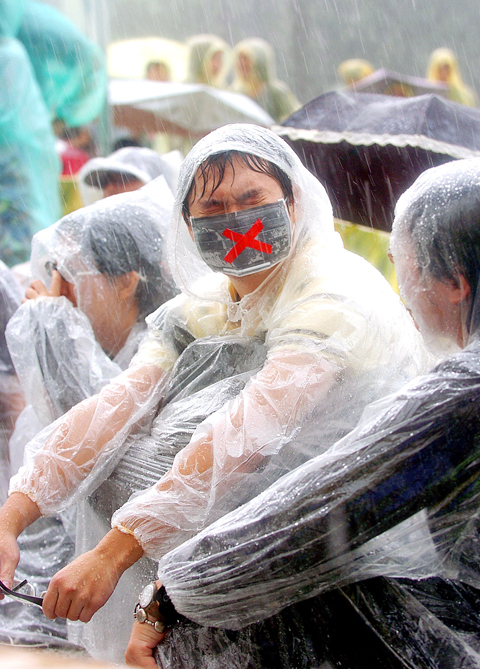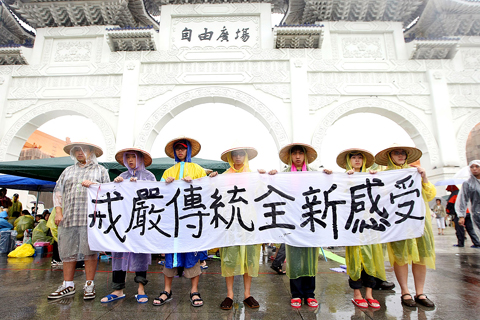“We want human rights!” chanted students at National Taiwan Democracy Memorial Hall as they continued their sit-in for a third day, demanding an apology from the government over what they called the “rough” tactics used by police to deal with protesters during the visit by China’s Association for Relations Across the Taiwan Strait Chaiman Chen Yunlin (陳雲林) last week.
Despite the poor weather yesterday, more than 100 students wore simple raincoats and remained sitting in protest in the Taipei rain.
The first two days of the sit-in protest saw hot, humid weather. Yesterday, downpours began at around 10am.

PHOTO: LO PEI-DER, TAIPEI TIMES
“The first trials of the weather have started, but despite our efforts, no one has stepped up to respond to our demands,” Hsu Ching-fang (許菁芳), president of the National Taiwan University Student Association, said to the crowd of students in the rain.
About 400 students, led by assistant professor of sociology at National Taiwan University Lee Ming-tsung (李明璁), started the sit-in in front of the Executive Yuan on Thursday at noon. The students believe that police, while protecting the safety of Chen and his delegation, acted improperly and that freedom of speech had been suppressed.
The student demonstrators were forcibly evicted by police from the front gate of the Executive Yuan on Friday night because they had not applied to conduct a protest there.

PHOTO: CNA
The students linked their arms together and refused to leave. Police had to take them away to nearby police vehicles, and then drove them to National Taiwan University.
Some students later reconvened in Liberty Square at National Taiwan Democracy Memorial Hall to continue the sit-in.
“Police officers have engaged in numerous abusive acts against peaceful protesters from various dissenting groups, under the guise of ‘keeping the peace,’” read an English statement issued by the students. “These acts have included arbitrary searches and prohibitions, seizure and destruction of property, physical assault, dispersion, and even arrest and detention.”
“Through reports in the media, we have come to realize the seriousness of the current situation. It is no longer a technical question of excessive law enforcement tactics, nor is it simply a partisan issue between supporters of various political parties. This is a proliferation of state-sponsored violence that is provoking and attacking civil society. All these oppressive acts, which ignore human rights and democratic values, are reminiscent of martial law,” the statement said.
The students yesterday insisted that they would continue with the sit-in protest until their three appeals were met: an open apology from President Ma Ying-jeou (馬英九) and Premier Liu Chao-shiuan (劉兆玄) to all citizens, the resignations of National Police Agency Director-General Wang Cho-chiun (王卓鈞) and National Security Bureau Director Tsai Chaoming (蔡朝明) and the swift amendment of the Assembly and Parade Law (集會遊行法).
Some observers compared the sit-in to the Wild Lily Student Movement (野百合學運) of 1990, which started as a student movement that eventually drew hundreds of thousands calling for political reforms, including the abolition of the National Assembly.
The protest this time not only brought students from different schools to the sit-in, but also redefined social movements as the students used the Internet to promote their appeal.
They have launched Internet petitions and set up live streaming videos with audiences all over Taiwan and in the US, Japan, Holland and Germany.
TAKE TURNS
The students have taken turns hosting the event in various languages. They also opened lines for call-ins during the night.
Sitting with the students, Lee said: “Taiwan’s youth still care about public issues, only nowadays, they are using new channels to voice their concerns.”
The Taipei City Government yesterday urged the student demonstrators to complete the legal processes for holding the protest.
Yang Hsiao-tung (羊曉東), the city government’s spokesman, said the sit-in protest, which was organized by students and has continued for more than one day, was an illegal demonstration.
He urged the students to apply with the city government for a rally permit to turn the sit-in into a legal protest.
“As the illegal protests during the past week have caused social instability, we urge the students to follow the law and apply for rally permits to prevent unnecessary confrontations between the police and protesters,” he said at Taipei City Hall.
Yang said the city government would grant the students a rally permit if they filed applications according to regulations.
Meanwhile, the Democratic Progressive Party yesterday lent support to the students, and urged Ma to deliver on his campaign promise to change the Assembly and Parade Law so that notification would be enough to stage a protest rather than having to apply first with authorities.
ADDITIONAL REPORTING BY MO YAN-CHIH, JIMMY CHUANG AND CNA

CHAOS: Iranians took to the streets playing celebratory music after reports of Khamenei’s death on Saturday, while mourners also gathered in Tehran yesterday Iranian Supreme Leader Ayatollah Ali Khamenei was killed in a major attack on Iran launched by Israel and the US, throwing the future of the Islamic republic into doubt and raising the risk of regional instability. Iranian state television and the state-run IRNA news agency announced the 86-year-old’s death early yesterday. US President Donald Trump said it gave Iranians their “greatest chance” to “take back” their country. The announcements came after a joint US and Israeli aerial bombardment that targeted Iranian military and governmental sites. Trump said the “heavy and pinpoint bombing” would continue through the week or as long

TRUST: The KMT said it respected the US’ timing and considerations, and hoped it would continue to honor its commitments to helping Taiwan bolster its defenses and deterrence US President Donald Trump is delaying a multibillion-dollar arms sale to Taiwan to ensure his visit to Beijing is successful, a New York Times report said. The weapons sales package has stalled in the US Department of State, the report said, citing US officials it did not identify. The White House has told agencies not to push forward ahead of Trump’s meeting with Chinese President Xi Jinping (習近平), it said. The two last month held a phone call to discuss trade and geopolitical flashpoints ahead of the summit. Xi raised the Taiwan issue and urged the US to handle arms sales to

BIG SPENDERS: Foreign investors bought the most Taiwan equities since 2005, signaling confidence that an AI boom would continue to benefit chipmakers Taiwan Semiconductor Manufacturing Co’s (TSMC, 台積電) market capitalization swelled to US$2 trillion for the first time following a 4.25 percent rally in its American depositary receipts (ADR) overnight, putting the world’s biggest contract chipmaker sixth on the list of the world’s biggest companies by market capitalization, just behind Amazon.com Inc. The site CompaniesMarketcap.com ranked TSMC ahead of Saudi Aramco and Meta Platforms Inc. The Taiwanese company’s ADRs on Tuesday surged to US$385.75 on the New York Stock Exchange, as strong demand for artificial intelligence (AI) applications led to chip supply constraints and boost revenue growth to record-breaking levels. Each TSMC ADR represents

State-run CPC Corp, Taiwan (CPC, 台灣中油) yesterday said that it had confirmed on Saturday night with its liquefied natural gas (LNG) and crude oil suppliers that shipments are proceeding as scheduled and that domestic supplies remain unaffected. The CPC yesterday announced the gasoline and diesel prices will rise by NT$0.2 and NT$0.4 per liter, respectively, starting Monday, citing Middle East tensions and blizzards in the eastern United States. CPC also iterated it has been reducing the proportion of crude oil imports from the Middle East and diversifying its supply sources in the past few years in response to geopolitical risks, expanding